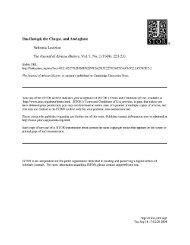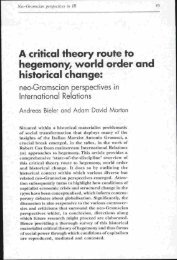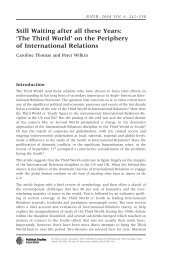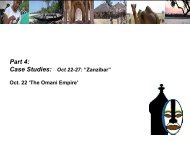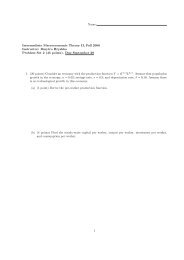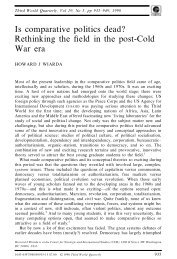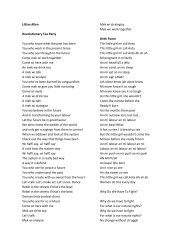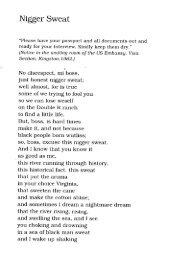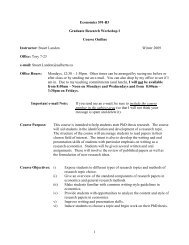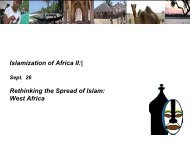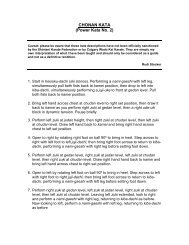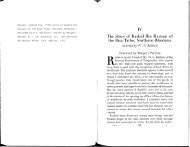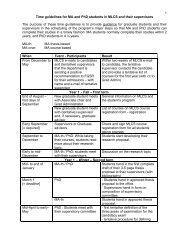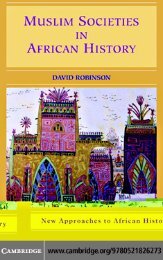personal memories revolutionary states and indian ocean migrations
personal memories revolutionary states and indian ocean migrations
personal memories revolutionary states and indian ocean migrations
Create successful ePaper yourself
Turn your PDF publications into a flip-book with our unique Google optimized e-Paper software.
Indian merchant class to whom many Arabs were indebted: “This is an Arab state.<br />
It is the duty of the protecting government to assist the protected people. It is<br />
impossible for us to st<strong>and</strong> by <strong>and</strong> take the risk of the expropriation of His<br />
Highness’s people.” 5<br />
Between 1924 <strong>and</strong> 1931, the number <strong>and</strong> percentage of “Arabs” in<br />
Zanzibar (<strong>and</strong> Pemba) increased from almost 19,000 (8.7% of the population) to<br />
about 33,500 (14.2% of the population). By 1948, there were about 44,500 Arabs in<br />
Zanzibar (13,977 “Arabs” on Zanzibar <strong>and</strong> 30,583 on Pemba) making up 16.9% of<br />
the population. While most of this increase was probably due to migration from<br />
Oman, according to Michael Lofchie <strong>and</strong> others, some of this increase was also due<br />
to a shift in the ways people were describing themselves in the local censuses. 6 Just<br />
as some “Swahilis” were increasingly claiming to be “Hadimu,” others were<br />
becoming “Arab”. 7 Nevertheless, it is clear that there was a dramatic increase in the<br />
numbers of Arabs on the isl<strong>and</strong>. And, many of these were considered “manga,”<br />
whether as more permanent residents or as temporary workers traveling to<br />
Zanzibar during the clove harvest.<br />
The British Protectorate administration, although relatively sympathetic to<br />
the Arab elite, attempted to quell the numbers of migrants, especially after the 1936<br />
riots. The increase of migration from Oman to Zanzibar <strong>and</strong> especially the<br />
increased numbers of destitute Arabs looking for temporary work on the clove<br />
plantations or at the Zanzibar port propelled the British Protectorate administration<br />
to promulgate several immigration decrees <strong>and</strong> regulations limiting the numbers of<br />
such recent migrants. Despite tensions with the new arrivals, the Arab Association,<br />
which was an officially recognized association dating to the 1920s <strong>and</strong> run by the<br />
elite of the Arab community, contested these limits. Discussions between the<br />
British administration <strong>and</strong> the Arab Association as well as documents between<br />
Muscat, Zanzibar <strong>and</strong> London outlining rulings, negotiations <strong>and</strong> numbers,<br />
however, suggest not only that the administration did not concede to the<br />
association, but also the ways that the security measures <strong>and</strong> rationings instituted<br />
during the Second World War were used to legitimize travel restrictions after the<br />
war as well.<br />
From 1923, the Immigration Regulation <strong>and</strong> Restriction decree had<br />
managed the entry of Arabs from Arabia <strong>and</strong> the African mainl<strong>and</strong> into Zanzibar.<br />
In 1940, however, the Protectorate Administration established another procedure<br />
under the Defense (Immigration Restriction) Regulations, geared specifically at<br />
Arabs arriving from Oman <strong>and</strong> the Hadramaut. There were several issues at stake<br />
for the British administration in the early 1940s. First, the numbers of immigrants<br />
had increased in the late 1930s when the Clove Growers Association began hiring a<br />
considerable number of buying agents from among the recent arrivals. 8 However,<br />
when the hiring policy changed in 1939 <strong>and</strong> the Association began purchasing<br />
directly from producers, both the previously employed <strong>and</strong> the prospective agents<br />
arriving from Muscat were left without jobs. The number of destitute Arabs<br />
increased <strong>and</strong> the Protectorate Administration began systematizing their<br />
repatriation procedures, not to mention their immigration policies. 9 Second, the<br />
protectorate administration claimed that during the Second World War, for security<br />
reasons, it was incumbent on them to limit the numbers of ships traveling the<br />
Indian Ocean. Third, private ships began dem<strong>and</strong>ing additional payments from<br />
Omani passengers in case, due to the heightened restrictions, they were turned back<br />
at Zanzibar port. Not all passengers were allowed to disembark at Zanzibar <strong>and</strong><br />
those who were refused entrance to Zanzibar, were sent back to Arabia or the<br />
http://web.mit.edu/cis/www/mitejmes/<br />
23



